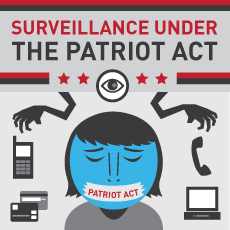
This week marks 10 years since the Patriot Act was signed into law by President George W. Bush. The ACLU is hosting a blog series that will address some of the sweeping changes to surveillance laws over the past decade. To learn more about the Patriot Act, visit www.aclu.org/patriot.
Ten years ago today, the Patriot Act was signed into law, dramatically expanding the government's authority to monitor the activities of all Americans, whether suspected of wrongdoing or not.
One section in particular, Section 215, gave the FBI unprecedented authority to obtain "any tangible thing" for an investigation related to international terrorism or espionage. The FBI has the power to use Section 215 to collect records held by businesses such as hotels, banks, stores, and internet service providers. They need to show only that the information is "relevant" to an investigation and, in 2010, every single 215 request was granted.
Despite the fact that this kind of dragnet surveillance can affect all Americans, we are largely in the dark about how Section 215 has been applied. Last May we filed a Freedom of Information Act (FOIA) request for information about the government's interpretation and use of this provision. Our renewed concern about the this "secret law" was prompted by senators' warnings over the significant discrepancy between the government's position on Section 215 and what the public understands it to mean.
Today we filed a lawsuit to force the government to comply with the FOIA request. We believe the public has a right to know how the government is interpreting a law that is carried out in secret and applies to all Americans.
We know that in 2010, the number of FBI requests for Section 215 orders more than quadrupled from the year before. Today, the Washington Post reports that the reason for the increase is that certain electronic communications service providers stopped honoring National Security Letters (which are issued by the FBI without a judge) demanding electronic communication transaction records. Exactly what types of transaction records that includes remains unknown.
We hope our lawsuit will paint a fuller picture of how the government's secret position has been applied and misused at the expense of ordinary Americans as well as what that position actually is. We anticipate that this information will further show that the Patriot Act does not make us safer. Instead, Section 215 and the "secret law" that surround it alienate us from our government and prevent us from fully reflecting about how the Patriot Act has shaped the past decade.
To learn more about how the Patriot Act turns ordinary citizens into suspects, check out our new infographic about surveillance under the Patriot Act.
Learn more about the Patriot Act: Sign up for breaking news alerts, follow us on Twitter, and like us on Facebook.


